2012: Victory in D.C., cries of murder in Florida
By Charlene Muhammad and Starla Muhammad Final Call Staffers | Last updated: Jan 1, 2013 - 11:34:55 AMWhat's your opinion on this article?
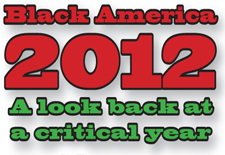
|
(FinalCall.com) - Politics, economics and violence brought the good, bad and ugly to Blacks in America in 2012.
While the re-election of President Barack Obama ranked highest for many among news stories affecting the Black community, people were just as concerned about finances and senseless violence typified by the shooting of a Florida teen, Trayvon Martin.
On the political front, the Black community’s aggressive response and opposition to right wing efforts to suppress their vote impressed Marc Morial, president and CEO of the National Urban League. He also feels the presidential re-election was a huge event for 2012 and will have major impact in 2013.
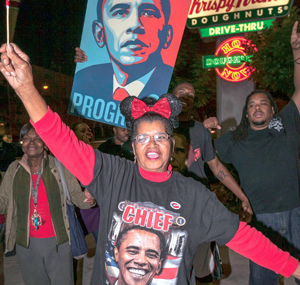
Laverne Wilson, 74, celebrates President Barack Obama’s victory in the presidential election, Nov. 6,
2012 in the Crenshaw district of Los Angeles. Photo: AP Wide World Photos/Damian Dovarganes)
|
“Voter suppression was a big story. In many respects we either stopped it in the courts, stopped it with the Justice Department, stopped it politically, or in most cases, people responded with due passion, saying we will not be prevented from voting. Strong African American voter turnout played a decisive role in many states,” Mr. Morial told The Final Call.
Blacks voted more than any other minority group this year for the first time in history, and may have voted at a higher rate than Whites, according to a recent study (“The Growing Electoral Clout of Blacks Is Driven by Turnout, Not Demographics”) by the Pew Research Center, a Washington, D.C.-based nonpartisan group.
In turn, Blacks need President Obama to address the most important issues of joblessness and unemployment, Mr. Morial said. The National Urban League has encouraged President Obama to reintroduce his American Jobs Act, which he introduced in 2011. It aimed to increase jobs without increasing the federal deficit, but was blocked in the Senate, Mr. Morial noted.
“I think it’s too early to predict specifics, but I do think that what we’re trying to do from an Urban League point of view is bring to the president ideas for support and endorsement ... but I also think we’ve got to put pressure on members of Congress, Democrats and Republicans, to elevate the priority,” Mr. Morial stated.
“It was a very tough environment for a president to be running for re-election. Romney and all those outside groups called him everything, all sorts of smears. But he had a campaign organization and his support was solid among the groups that support him and he was able not just to win, but to win impressively,” noted Dr. David Bositis, senior research fellow at the Joint Center for Political and Economic Studies.
Black economics and 2012
The residual effects and fallout from the Great Recession pummeled the Black community in 2012 as unemployment rates remained in double digits and any glimpse of a recovery from a widening wealth gap was stagnant at best.
James Clingman, Jr., founder and executive director of the Greater Cincinnati African-American Chamber of Commerce, evaluated the year from an economic perspective.
Blacks have been in the same position for the last three decades, unemployment rates were double national rates, with joblessness in some cities as high as 50 percent, he said.
“It tells me to move forward economically, a lot of work needs to be done. I’m talking about self-help. I’m not just talking about sitting back and waiting on somebody, the government or Obama or anybody else, to come and do for us what we can do for ourselves,” Mr. Clingman told The Final Call.

|
Blacks in 2013 must simply do more, and they can start with collective work around economic empowerment through starting and growing Black businesses to help employ Black people, he said.
Mr. Clingman cited the prison industrial complex and Black status in politics as things to be concerned about, but he feels if Blacks made a strong economic base, they could use economic power to get more of their concerns dealt with.
“We have too much income in this country collectively to be in the position that we’re in economically but we’re just not acting appropriately. We’re complaining about supermarkets not moving in our neighborhoods. We complain and march but we don’t rally together to open up our own stores,” Mr. Clingman argued.
His sentiments echoed Minister Louis Farrakhan’s consistent guidance and warning to Blacks: Unite and pool your resources in order to survive.
This year saw the Muslim leader take this resounding and critical message to college campuses in cities across the U.S. as well as to Blacks in the Caribbean, planting seeds in the hearts and minds of young and old alike that economic self-sufficiency and working together is the only solution to what ails the community.
People that respect themselves and their communities produce goods and serve the people of their community the Minister told packed auditoriums as he crisscrossed the country.
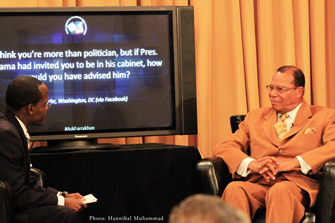
Ashahed M. Muhammad and the Honorable Minister Louis Farrakhan at the first ever #AskFarrakhan Social Media Q&A on September 26, 2012. Photo: Hannibal Muhammad
|
“The Honorable Elijah Muhammad said, ‘Pool our resources intellectually and financially and start with six or eight persons of like mind and don’t break apart,” Min. Farrakhan responded in part.
With the concern and love for his people always at the forefront of his heart and mind, Min. Farrakhan will again give enlightenment and expound upon the theme of economic independence during his keynote address at the Nation of Islam’s Saviours’ Day Convention on February, 24, 2013 in Chicago. His message, “Muhammad’s Economic Blueprint: Ending Poverty & Want” will give further guidance and practical application as a way out for Blacks and the poor of the country.
The Minister has noted continued Black cries for jobs and justice. The cry began in the 1940s with labor leader A. Philip Randolph; rose again in 1983 at the 20th Anniversary of that historic march on Washington; and continues today, Min. Farrakhan noted.
“As a student of the Honorable Elijah Muhammad, I would like to disabuse us of the thought that our president can create enough jobs for our millions of unemployed and White America’s unemployed,” Min. Farrakhan said.
He said his aim was to call Blacks back to remembrance of the Honorable Elijah Muhammad who said and wrote on the back page of Muhammad Speaks newspapers and now on back page of The Final Call, in “The Muslim Program.”
“We do not believe that America will be able to furnish enough jobs for her millions of unemployed and ours too.”—that was in the 1960s. Now here we are, 50 years later, and factories are closed down: … I want our beloved brothers and sisters to pay attention to these statistics,” Min. Farrakhan said in a media interview.
Although year-end December jobs numbers will not be released by the U.S. Department of Labor until January 4, if the prior 12 months is any indication, Black unemployment could possibly continue hovering between 13 and 14 percent through 2013. The unemployment rate for Blacks in Sept., Oct. and Nov. of 2012 averaged 13.6 percent.
“We’ve had more than four years of unemployment rates over 10 percent. We’ve been in a period of high unemployment, continue to be in a period of high unemployment and unfortunately the projections are that there will be slight improvement across 2013 but without a real national commitment to lowering the unemployment rate, next year looks like pretty much more of the same, slightly better but again continued high unemployment for African Americans,” Dr. Algernon Austin, director of the Race, Ethnicity and the Economy Program with the Economic Policy Institute told The Final Call.
Analysis and reports also confirmed Blacks lost tremendous amounts of wealth since 2007 and have yet to recover five years later. Median wealth between White and Black households showed a major disparity: Median wealth $134,992 for Whites and $12,124 for Blacks in 2005. In 2009, though both groups lost wealth, average wealth for Whites was $113,149 versus $5,677 for Blacks, according to the Pew Research Center.
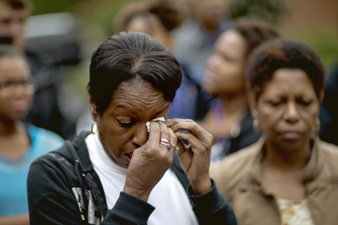
Retired Atlanta police Det. Jaqueline Barber wipes a tear during a news interview. Barber said she is under threat of eviction
after her medical bills mounted, partly because of a diagnosis of multiple myeloma, a form of blood cell cancer. If she’s
evicted with her daughter and four grandchildren, she expects that she will be homeless. Photo: AP Wide World Photos/David Goldman
|
There is no reason to expect that over the last couple of years, there had been much recovery of wealth, said Dr. Austin.
“It’s possible that the wealth losses have continued because of the foreclosure problems and the problems of high unemployment continues. If you don’t have a job, it’s going to be very difficult for you to keep up with your mortgage and if you lose your house, for the typical Black family, you’re losing 80 to 90 percent of your wealth,” added Dr. Austin.
As author of several reports and studies, Dr. Austin noted although it has been a bad year overall for Blacks, any cuts made to Social Security during the so-called “fiscal cliff” negotiations would be the equivalent of “putting the icing on the rotten cake.”
Social Security benefits are extremely important to Blacks with disabilities, children and retirees he added. Blacks have the highest rate of those that rely on Social Security as their primary mode of income, said Dr. Austin.
Further, if no White House-Congress agreement is reached, everybody’s taxes will increase and there would be $100 billion in budget cuts 50 percent from the Department of Defense and 50 percent from domestic programs, Dr. Bositis explained.
“People would stop spending and investing and the economy would go into a recession. If an agreement can be made there are a lot of signs that the economy could really pick up and could grow by three percent a year. If so, then you would start to see Black unemployment, homelessness and a whole variety of problems would decline. It’s been a rough year but it’s over,” Dr. Bositis added.
At Final Call press time, negotiations between President Obama and Congress to avoid automatic budget cuts and tax increases were still ongoing.
“I think most people are doing everything that they can. The Census data tells us that people have moved in with their relatives. We’re seeing the highest rates of multi-generational households. I’m sure people have cut back,” Dr. Austin said.
Justice for Trayvon: A tragic death galvanizes Blacks
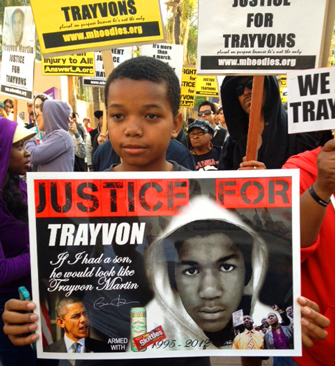
Youth holds poster supporting Trayvon Martin during L.A.’s “Million Hoodie March” on April 9, 2012.
|
“You know it was bittersweet,” said Chicago’s 1690 WVON radio personality Perri Small when asked what 2012 symbolized and meant for the Black community.
“I saw African Americans this year stand up and stand up for something from Trayvon Martin to this 2012 presidential election. We do matter,” said Ms. Small, host of the popular mid-day Perri Small Show. WVON is Black-owned and will be celebrating its 50 year anniversary in 2013.
Unarmed Florida teen Trayvon Martin, 17, was shot and killed by George Zimmerman, a self-appointed neighborhood watch captain in Sanford, Fla. in February. Only after mass rallies, protests sparked by relentless efforts by Trayvon Martin’s parents did Florida officials finally arrest and charge Mr. Zimmerman with second-degree murder.
“What I saw is that when African Americans, when you tell them that they can’t do something, if they really are passionate about it, they will. Rather it be to get an indictment on George Zimmerman for murdering Trayvon Martin or if you tell them that we are going to stifle your right to vote, we’re going to suppress your vote, we’re going to institute voter ID laws and we said, ‘OK, so we’ll stand in line six or eight during early voting.’ That’s what really stood out for me this year,” the long-time journalist continued.
The killing of Trayvon Martin, February 26, 2012 brought feelings of tragedy and triumph to the Black community over what many called a senseless act. The tragedy was the loss of a young life, the triumph was the eventual indictment of his shooter for second degree murder after mass protests and expressions of outrage.
When George Zimmerman fatally shot the teen after what many called racially profiling him, activists, attorneys, politicians and religious leaders, students, prominent athletes, and ordinary people joined street protests, online organizing campaigns, rallies and marches from college campuses to the U.S. House of Representatives where Illinois Congressman Bobby Rush wore a hooded sweatshirt on the floor in expressing concern about violence and targeting of Black youth. Rep. Rush was escorted out of the chamber for being inappropriately dressed though he wore a shirt and tie under the hoodie, similar to one worn by young Martin the night of his death.
“This case gives America a chance to show as a whole, in the 50 years since Emmett Till, that we do have equal justice in America. Because a message is going to be sent out when this case is concluded and the question is going to be, can anybody get justice in America anywhere at any time?” Atty. Benjamin Crump, Mr. Martin’s family attorney, told The Final Call.
It will send a bigger message on the value of the lives of little Black and Brown children, Atty. Crump added.
The re-election of President Obama and rallying around the Trayvon Martin story were examples of Blacks coming together to exact change in 2012, said Ms. Small.
“If we did it in those two instances, we can do it for anything,” she said.
Promoting peace in violent streets
Though national and international attention focused on killing of Trayvon Martin, there were dozens of other instances of shooting deaths of Black youth, by law enforcement officials and other Black youth equally as tragic and outrageous but did not make prominent headlines.
In Chicago, 22-year-old Rekia Boyd also unarmed was fatally shot in the head by an off-duty police officer in March. In a suburb of Chicago, Stephen Watts, 15, was shot and killed in his home by Calumet City police when officers said he lunged at them with a knife. No charges were brought against the officers in either case.
The elusiveness of equal justice for Blacks in the criminal justice system remained the same. Howard Morgan, a former police officer was sentenced in April to 40 years in prison for attempted murder of four Chicago police officers despite suffering 28 bullet wounds from a hail of police gunfire directed at him.
Besides police violence there was an epidemic of shootings and violence in the Black community, in particular among Black males. In cities across America and in several nations, the men of the Nation of Islam made a concerted effort to go into the streets to lessen tension and promote peace. Min. Farrakhan, sparked by a question during a July appearance on the Cliff Kelley Show on WVON-AM, vowed to lead the Fruit of Islam into the streets and he did. The impact was stunning as the nearly 80-year-old leader walked through neighborhoods wrecked by violence, embracing elders, youth and children and spreading a message of guidance and hope. Starting in places like Chicago areas nicknamed “Terror Town” and “The Wild 100s,” Min. Farrakhan, and the Fruit of Islam urged an end to fratricidal violence, warning that urban conflict would be manipulated to justify a crackdown on the Black community and targeting of Black males.
The Minister spoke to youth, in particular, about a great future that is in line with prophecy, and stressed the need to do something for self. The F.O.I. handed out free copies of DVD messages by Min. Farrakhan, fliers urging peace and The Final Call newspaper.
“This is a very crucial time in our history and in the history of America, and in the history of the world,” Minister Farrakhan said at a rally in Lincoln Park in New Rochelle, N.Y., which preceded a historic return to Harlem to share the message of peacemaking. “We have a great role to play because we believe that Almighty God—Who, by whatever name we call Him—has chosen us to be His people.
“In spite of our condition, he said he would take the bottom rail, and bring it to the top. And the last will be first. And thou shall no more be the tail, but thou shall be the head. And as God has chosen us as the cornerstone of a brand new world, because this one has fulfilled its time and its time is up,” the Nation of Islam minister continued.
“We are in a danger zone. There’s tremendous hatred being built up by the media and others against Brother Barack Obama, and there is a polarization now taking place between those who would vote for Barack Obama, and those who would vote for the other fellow,” said Minister Farrakhan. “Tell it like it is,” an audience member shouted as others interrupted his remarks with applause.
“Maybe some are disappointed, but we didn’t elect him to run on a Black Agenda. He is the American president. So we can’t expect him to do for us, what we have to unite and do for ourselves,” Minister Farrakhan said to enthusiastic applause.
“He can create an atmosphere for us to move in, but it would be unfair to him, for us to ask him to do for us, what he really doesn’t have the power to do.” That power is in the hands of the international bankers, corporate America. That power is the power of money, the Muslim leader pointed out.
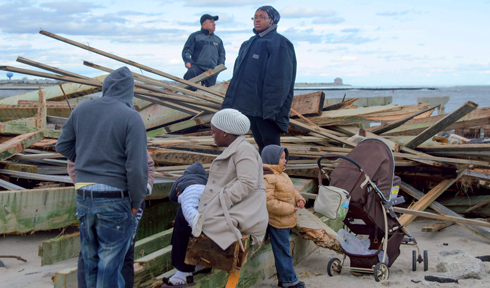
Atlantic City, N.J., Residents stand amid rubble to see if they can catch a glimpse of President Obama during his tour of the
devestated city Oct. 31. The historic boardwalk was destroyed by fi erce winds that hit during Hurricane Sandy. Photo: Liz Roll/FEMA
|
Data released in several 2012 reports reflected other areas of concern and crisis for Black America. The economic crisis over the last five years has pushed Black children into an “abyss of poverty, hunger, homelessness and despair,” according to the Children’s Defense Fund’s “The State of America’s Children Handbook.”
In virtually all areas, such as poverty, family structure, income, health, education, jobs, juvenile and adult criminal justice and violence, Blacks were struggling and battling disproportionately compared to other groups according to the organization, which was founded by activist and advocate Marian Wright Edelman.
In its annual release on the state of Black males in public education, the Schott Foundation for Public Education noted barely over half of Black males are graduating high school and very few are proficient in critical areas like reading. Though the data released in the group’s 2012 report analyzed findings from 2009-2010, the overall news when it comes to the education of Black boys and young men was not good.
Graduation rates for Black boys was under 50 percent in states like Illinois, Indiana, Florida, New York and Ohio. In many school districts, Black students were more likely to be suspended or expelled than White students.
Stress, strain and pain of dealing with pressing issues and the ability to effectively navigate day to day life effects mental health and well-being, two critical issues in 2012.
In a move Chicago officials said was designed to save money, six mental health clinics that primarily serviced the Black community were closed over the past year.
Access to counseling and mental health facilities to help people negotiate through difficult times is key and other avenues may have to be explored, experts noted.
“Depression is soon going to be like the world’s number one disability. People get up, they go to work, they sit at their desk and they cannot function. So it’s coming out some kind of way. Whether you’re having some kind of unnecessary beef with somebody in the office because of something that you didn’t deal with or whether you take it out on your kids, calling them out of their name or hitting them. It’s a tough situation,” Terrie Williams’, mental health advocate and author of the popular and critically acclaimed book, “Black Pain: It Just Looks Like We’re Not Hurting,” told The Final Call.
INSIDE STORIES AND REVIEWS
-
-
About Harriett ... and the Negro Hollywood Road Show
By Rabiah Muhammad, Guest Columnist » Full Story -
Skepticism greets Jay-Z, NFL talk of inspiring change
By Bryan 18X Crawford and Richard B. Muhammad The Final Call Newspaper @TheFinalCall » Full Story -
The painful problem of Black girls and suicide
By Charlene Muhammad -National Correspondent- » Full Story -
Exploitation of Innocence - Report: Perceptions, policies hurting Black girls
By Charlene Muhammad -National Correspondent- » Full Story -
Big Ballin: Big ideas fuel a father’s Big Baller Brand and brash business sense
By Bryan Crawford -Contributing Writer- » Full Story






 Click Here Stay Connected!
Click Here Stay Connected!








